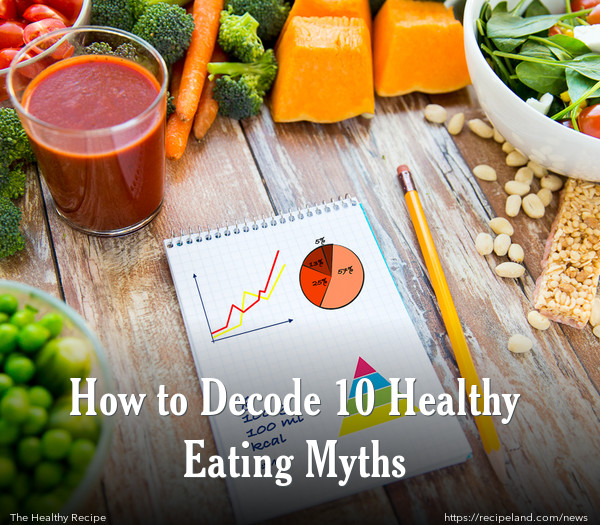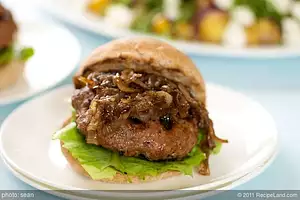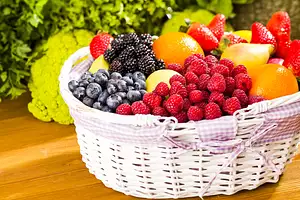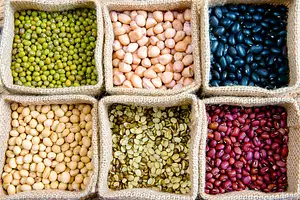It is difficult to sort through the endless amounts of information that you will find when you try to learn how to eat healthy. Knowing what to believe can be confusing, with so much contradictory information. We have asked some nutritionists to clarify 10 myths about healthy eating, so that you can have better information to make your healthy eating decisions.
1. For best nutrition, you must eat fresh fruits and veggies
Today’s frozen fruits and veggies are flash frozen very quickly after harvesting them, which helps to preserve the nutrients and vitamins. Most nutritionists would agree that fresh is best when it is available, but opting for frozen fruits and vegetables will not be a nutritional compromise. It’s helpful to keep some frozen fruits and vegetables handy for times when you may not be able to get the fresh versions.
2. Periodic cleansing or detox is important for your health
Your body is well designed to detoxify itself and perform periodic cleansing, through the normal healthy function of your organs. There are not any juice diets or pills that can do a better job.
3. Counting calories is the only way to lose weight
While keeping your caloric intake at a level that is within the number of calories that you burn, keep in mind that 100 calories of cookies is not the same as 100 calories of carrots. Instead of counting the number of calories, count the number of servings of fruits and vegetables, and make sure that you are getting plenty of the important vitamins and minerals that your body needs.
4. Some diets are better than others
There is not one diet or one way to eat that works best for every person. Choosing a healthy eating plan that gets you the nutrition that your body needs—while being a lifestyle that fits, is what works best for each person.
5. Juice cleansing can boost your metabolism
Juicing does provide a great amount of vitamins and nutrients, when you are juicing raw fruits and vegetables, but a full juice cleanse that eliminates protein will not help to boost your metabolism. In fact, it can do just the opposite because your body relies on protein to keep running smoothly. If you want to juice, do this for no more than one meal per day. Add some Greek yoghurt for a protein boost, and to help boost your metabolism!
6. Eating after 6 pm will make you fat
The time of day when you eat has little to no effect on whether or not you gain weight. It is more important to consider what foods you are eating. For example, a snack of fruits or veggies before bed is not going to cause you to gain weight, but a huge bowl of ice cream might be additional calories that you don’t need and won’t burn. Most of the time, people who are eating late have skipped meals during the day and are hungry—which could lead to overeating, and weight gain.
7. You must eat 6 small meals each day
This is another myth that should be carefully considered. Those who eat 5-6 small meals may feel unsatisfied because they are not sitting down to a “full” meal, instead feeling like they are constantly snacking. Others will benefit from the 6 smaller, healthier meals. Being satisfied is an important part of maintaining a healthy weight and avoiding overeating. If you are choosing to eat 6 small meals, then make certain that you are making healthy but satisfying choices.
8. Eggs are not part of a healthy diet
Eggs have had a difficult time establishing a good reputation as part of a healthy diet. The truth is, eggs are very nutritious. They have healthy fats and plenty of protein, which makes you feel fuller longer. The yolks contain essential fatty acids that are important for your overall health (and brain function).
9. You get fat by eating fat
Certain fats are considered to be an important part of a healthy diet. However, eating too many trans fats will not only lead to fat gain, but other potential problems. Choose healthy fats, including essential fatty acids and monounsaturated versions for a healthy diet.
10. Low carb diets are best
Carbohydrates are an important part of a healthy diet and should not be eliminated. Choosing the right carbohydrates is important, however. Get your carbs from fruits, veggies and whole grains for best results.
There are so many myths circulating about healthy diets, but these facts should help you realize what kinds of foods you should be putting into your body for best function!










Comments